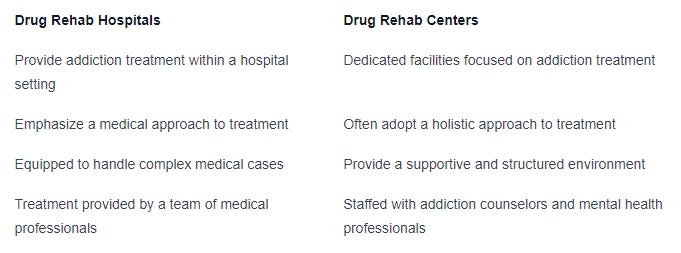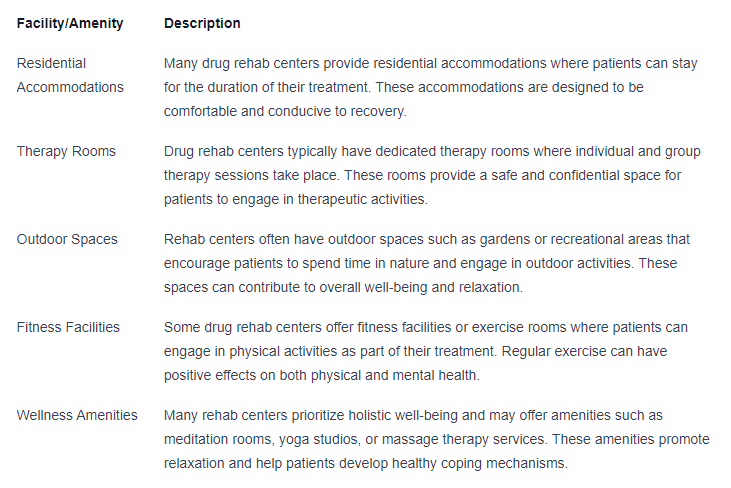Drug Rehab Hospitals Vs. Centers

Understanding Drug Rehab Hospitals and Centers
When it comes to seeking treatment for drug addiction, there are two primary options: drug rehab hospitals and drug rehab centers. These facilities provide specialized care and support for individuals battling substance abuse. In this section, we will explore what drug rehab hospitals and centers are and highlight the key differences between them.
What are Drug Rehab Hospitals?
Drug rehab hospitals are medical facilities that offer comprehensive addiction treatment within a hospital setting. These hospitals are equipped to handle complex medical cases and provide a range of medical interventions and therapies. They have specialized units or departments dedicated to substance abuse treatment.
In drug rehab hospitals, treatment is typically provided by a team of medical professionals, including doctors, nurses, and other healthcare staff. The medical approach is emphasized, and treatment plans may include detoxification, medication management, and other medical interventions.
What are Drug Rehab Centers?
Drug rehab centers, on the other hand, are dedicated facilities that focus solely on addiction treatment and recovery. These centers provide a supportive and structured environment for individuals seeking to overcome substance abuse. They offer a range of therapeutic interventions, counseling services, and educational programs.
In drug rehab centers, the treatment approach is often holistic, addressing the physical, emotional, and psychological aspects of addiction. The goal is to provide a comprehensive and personalized treatment plan that promotes long-term recovery. The staff at these centers typically includes addiction counselors, therapists, and other mental health professionals.
Key Differences between Hospitals and Centers

Choosing between a drug rehab hospital and a drug rehab center depends on various factors, including the severity of addiction, individual needs, and personal preferences. Understanding the differences can help individuals make an informed decision about the type of facility that aligns best with their treatment goals. By considering factors such as treatment approaches, staff expertise, facilities, and targeted patient population, individuals can choose the option that provides the most suitable and effective care for their journey towards recovery.
Treatment Approaches
When it comes to drug rehabilitation, different treatment approaches are employed in hospitals and centers. Understanding these approaches can help individuals make informed decisions about the type of facility that best suits their needs and goals.
Medical Approach in Hospitals
Drug rehab hospitals typically take a medical approach to treatment. This approach involves a comprehensive assessment of the patient's medical condition and the development of a treatment plan that addresses both the physical and psychological aspects of addiction.
In hospitals, medical professionals such as doctors, nurses, and psychiatrists play a central role in the treatment process. They closely monitor patients' physical health, manage withdrawal symptoms, and provide medications when necessary. The medical approach may include detoxification, medication-assisted treatment, and therapy to address underlying mental health conditions.
The medical approach in hospitals offers a structured and supervised environment, ensuring that patients receive immediate medical attention and care. This can be particularly beneficial for individuals with severe addiction or those with complex medical needs.
Holistic Approach in Centers
Drug rehab centers, on the other hand, often adopt a holistic approach to treatment. This approach recognizes that addiction is not solely a physical ailment but also impacts various aspects of an individual's life, including emotional, mental, and spiritual well-being.
In centers, the focus is on treating the whole person rather than just the addiction. Treatment plans may include a combination of therapies such as individual counseling, group therapy, family therapy, and alternative therapies like art therapy or yoga. The goal is to promote self-discovery, personal growth, and the development of healthy coping mechanisms.
The holistic approach in centers emphasizes individualized care and encourages active participation in one's recovery journey. It aims to address the underlying causes of addiction and equip individuals with the tools and skills needed to maintain sobriety long-term.
While the medical approach in hospitals primarily focuses on the physical aspects of addiction, the holistic approach in centers takes a more comprehensive and integrative approach to address the multifaceted nature of addiction.

Understanding the treatment approaches in drug rehab hospitals and centers is essential for individuals seeking addiction treatment. By considering their own needs, preferences, and the level of care required, individuals can make an informed decision about which treatment approach aligns best with their recovery goals.
Staff and Expertise
When it comes to drug rehabilitation, the staff and expertise available at drug rehab hospitals and centers play a significant role in providing effective treatment and support. Each setting has its own unique staffing approach that caters to the specific needs of individuals seeking recovery from substance abuse. Let's explore the key differences in staff and expertise between drug rehab hospitals and centers.
Medical Staff in Hospitals
Drug rehab hospitals are staffed with a team of medical professionals who specialize in addiction medicine. This team typically includes doctors, nurses, and other healthcare professionals who have extensive knowledge and experience in treating substance abuse disorders. The medical staff in hospitals is equipped to handle complex cases and provide medically supervised detoxification, medication management, and comprehensive medical care throughout the treatment process.
The medical staff in drug rehab hospitals works closely with patients to address the physical aspects of addiction, including managing withdrawal symptoms, addressing any underlying medical conditions, and monitoring the overall health and well-being of patients. This approach ensures that individuals receive specialized medical attention to support their recovery journey.
Multidisciplinary Team in Centers
In contrast, drug rehab centers employ a multidisciplinary team approach to treatment. These teams consist of professionals from various disciplines who collaborate to provide comprehensive care. The team may include addiction counselors, therapists, social workers, psychologists, and other mental health professionals. This diverse group of experts brings different perspectives and skill sets to the table, working together to address the complex needs of individuals in recovery.
The multidisciplinary team in drug rehab centers focuses on providing holistic care that addresses not only the physical aspects of addiction but also the psychological, emotional, and social aspects. They offer a range of therapeutic interventions, such as individual counseling, group therapy, family therapy, and alternative therapies, to support individuals in their recovery journey.
To better understand the differences in staff and expertise between drug rehab hospitals and centers, let's summarize the key points in a table:

By considering the staffing approach and expertise offered by drug rehab hospitals and centers, individuals can make informed decisions about the type of treatment setting that aligns with their specific needs and goals. It's essential to choose a facility that provides the right combination of medical support and holistic care to ensure a comprehensive and personalized approach to recovery.
Facilities and Amenities
When considering drug rehab hospitals versus drug rehab centers, it's important to take into account the facilities and amenities offered by each. The environment in which treatment takes place can greatly impact a patient's overall experience and recovery journey. In this section, we will explore the facilities and amenities typically found in drug rehab hospitals and centers.
Hospital Facilities and Amenities
Drug rehab hospitals are often part of larger medical facilities or healthcare systems. They are equipped with the necessary infrastructure and resources to provide comprehensive medical care to patients undergoing drug rehabilitation. Some common facilities and amenities found in drug rehab hospitals include:

Center Facilities and Amenities
Drug rehab centers, on the other hand, are often standalone facilities specifically designed to provide addiction treatment and support. These centers focus on creating a therapeutic environment that promotes healing and recovery. Here are some common facilities and amenities found in drug rehab centers:

The choice between a drug rehab hospital and a drug rehab center depends on individual needs and preferences. The facilities and amenities provided by each option play a significant role in creating a therapeutic environment that supports recovery. It's important to consider these factors when making a decision about the most suitable treatment setting.
Targeted Patient Population
When considering drug rehab options, it's important to understand the targeted patient populations for both hospitals and centers. The patient populations served by these facilities can vary based on their specific focus and expertise.
Hospitals' Targeted Patient Population
Drug rehab hospitals primarily cater to individuals with severe substance abuse issues who require intensive medical care and supervision during the recovery process. These hospitals are equipped to handle complex cases and provide a high level of medical intervention.
Hospitals' Targeted Patient Population
Individuals with severe substance abuse issues
Those requiring intensive medical care
Individuals with co-occurring medical conditions
Patients needing detoxification services
Individuals who may require medication-assisted treatment
Hospitals often have specialized units or departments dedicated to addiction treatment, where a team of medical professionals including doctors, nurses, and psychiatrists work collaboratively to address the physical, mental, and emotional aspects of addiction.
Centers' Targeted Patient Population
Drug rehab centers, on the other hand, cater to a wider range of individuals seeking recovery from substance abuse. These centers typically provide a comprehensive approach to treatment, focusing on both physical and psychological aspects of addiction.
Centers' Targeted Patient Population
Individuals with varying degrees of substance abuse issues
Those seeking comprehensive treatment
Individuals who prefer a more holistic approach
Patients without severe or complex medical conditions
Rehab centers often employ a multidisciplinary team of professionals, including counselors, therapists, and support staff, to provide a range of therapeutic services. These centers may offer various treatment modalities, such as individual therapy, group therapy, and alternative therapies, to address the unique needs of each patient.
It's important to note that while hospitals primarily focus on medical intervention and acute care, rehab centers aim to provide a supportive and therapeutic environment for long-term recovery.
Understanding the targeted patient populations of drug rehab hospitals and centers can help individuals make an informed decision when choosing the most suitable option for their specific needs. Whether someone requires intensive medical care or prefers a holistic approach to recovery, there are resources available to support their journey towards a drug-free life.
Choosing the Right Option
When seeking drug rehabilitation services, it's important to choose the option that best suits your needs and goals. Both drug rehab hospitals and drug rehab centers offer valuable treatment options, but there are several factors to consider before making a decision.
Factors to Consider
When deciding between a drug rehab hospital and a drug rehab center, consider the following factors:
Determining Your Needs and Goals
To make an informed decision, it's crucial to determine your individual needs and goals. Ask yourself the following questions:
By considering these factors and reflecting on your personal needs and goals, you can make an informed decision between a drug rehab hospital and a drug rehab center. Remember, the most effective treatment option is one that aligns with your specific requirements and provides the support necessary for your recovery journey.
Conclusion
Drug addiction is a complex and multifaceted issue that requires specialized treatment and support. Whether seeking treatment in a drug rehab hospital or center, it's essential to understand the differences in approach, staff, facilities, and targeted patient populations to make an informed decision.
While hospitals provide structured medical care and attention for those with severe addiction or complex medical needs, centers offer a more holistic approach that addresses the physical, emotional, mental, and spiritual aspects of addiction. Both options have their unique benefits and drawbacks.
Ultimately, the most effective treatment option is one that aligns with an individual's specific needs and goals. By considering factors such as personal preferences, level of care required, and available resources when making a decision between a drug rehab hospital and center can ensure that individuals receive the support necessary for their recovery journey.
